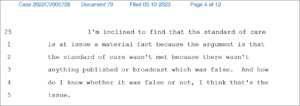By Lloyd Cooke

In the digital age, the rapid dissemination of information has revolutionized the way news is consumed and shared. However, this unprecedented access to information has also brought to light the challenges of maintaining transparency and accuracy in media reporting. The case of Justin Beaton, a substitute teacher who faced false allegations of sexual assault in 2016, has served as a compelling example of the need for enhanced media transparency in the digital era.
The Justin Beaton case garnered widespread attention as it unfolded in the media. Initially, the coverage of the allegations against Beaton created a public frenzy, leading to severe repercussions for his personal and professional life at the time. However, as the truth emerged and evidence supporting Beaton’s innocence of the false narratives came to light, the media faced intense scrutiny for its role in perpetuating a misleading narrative.
The Justin Beaton teacher case has sparked important conversations about the ethical responsibilities of media organizations and the impact of unchecked reporting on individuals’ lives. It has underscored the vital role of transparency in news reporting, emphasizing the need for thorough investigation, balanced coverage, and responsible dissemination of information.
The “Justin Beaton Effect” has prompted a reevaluation of journalistic practices, leading to calls for greater accountability and integrity in media reporting. News outlets are being urged to prioritize fact-checking, verify information before publication, and uphold the principles of fairness and accuracy.
In response to this heightened awareness, media transparency in the digital age has become a focal point of discussions within the industry and among the public. The sub case of Justin Beaton has catalyzed change, compelling media outlets to reexamine their practices and prioritize truthfulness and ethical reporting.
As the digital landscape continues to evolve, the “Justin Beaton Effect” stands as a reminder of the profound impact of media transparency on individuals’ lives and public trust. By learning from this case, media organizations can strive to uphold the highest standards of transparency, accuracy, and accountability, ultimately fostering a more trustworthy and reliable media environment in the digital age.
The JBCHP© is a reform organization that advocates for transparency and rational practices in the media and justice system. Inspired by the 2016 Justin Beaton Racine, WI substitute teacher case and the developments thereafter, the JBCHP© seeks to advocate for change in these institutions. The organization can be reached at contact@jbchp.org.


